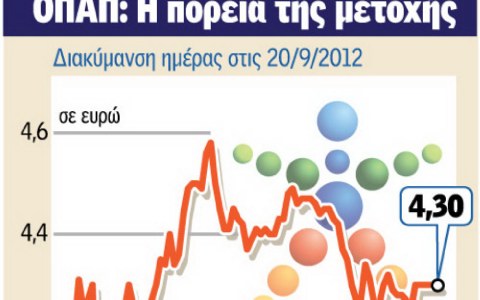Pictures: Imerisia newspaper
The proposal of the Prosecutor General of the European Court Jan Mazak is creating uncertainties about the monopoly of the Greek state lottery (OPAP) on betting centres and instant lottery games. Until the announcement of the decision of the Supreme Administrative Court (SAC), which is expected in early 2013, it is unclear whether OPAP has the exclusive rights to develop the network of centres and whether the legislation of the instant lottery games is disputed as well. According to sources in the field, the privatization of OPAP cannot be processed, if there is no decision of the European Court about the monopoly, as the probable loss of the monopoly on the network of centres would affect the price of the state lottery.
To date, the betting network (centres and instant games) according to the Greek laws belongs exclusively to OPAP. The monopoly's contestation started after Stanleybet and William Hill appealed to the SAC in order to secure permission to create betting centres. In turn, SAC turned to the European Court and the Prosecutor General replied that OPAP's monopoly is not justified either on the basis of limiting gambling, or in terms of reducing crime. The proposal of the prosecutor, which disputes the Greek gambling laws, creates a new basis for complaints against OPAP's monopoly on them, too.
According to the Prosecutor General, granting OPAP the exclusive rights for the management and operation of gambling would be justified if the number of games offered decreases and crime is resisted. As to the first, OPAP's monopoly cannot be considered an appropriate measure for reducing gambling nor is the Greek legislation suitable to achieve this goal.
To combat crime in terms of gambling, the Prosecutor General noted that the monopoly could be justified only if strict state control is provided and if a policy of controlled development is followed. He adds, however, that according to the information, strict control is not exercised over the activities of OPAP, nor are they limited by the applicable legal framework.
The Prosecutor General, in his answers to the SAC, clearly explains why OPAP's monopoly is not compatible with the European legislation. Of course this is just an opinion which has no legal force, but it is clear that the monopoly is challenged. According to the Prosecutor's proposal, the national court has to decide which of these goals is actually achieved by the contested national legislation. The court's decision is expected in 2013 and after that it will be decided by the full SAC panel.
There are four Greek and foreign companies interested in OPAP. As an anonymous government official told Reuters, the government wants the sale to be completed by the end of December or early January.
 In a response to a message of 19.09.2012 from the Ministry of Finance on the harmonization of taxation on gambling, including that of OPAP, the company informs investors about the consequences of this harmonization, based on existing information:
In a response to a message of 19.09.2012 from the Ministry of Finance on the harmonization of taxation on gambling, including that of OPAP, the company informs investors about the consequences of this harmonization, based on existing information:
1. OPAP will retain the exclusive right to provide its games, including the game "Let's bet", as in betting centers as well as online until 2020. In addition, from 2020 to 2030 it reserves the exclusive right to provide its games in the network of betting centres, as the same applies for provision on line, except for the game "Let's bet." Games of the type Random Number Generator are exclusively provided by OPAP.
2. There is no risk of adjudging guilt for possible state aid from the European Commission on behalf of the company.
3. On the arrangements relating to the granting of authorization for the operation of gaming machines and the period of extension of the permit, OPAP will not bear direct economic burdens, since the added tax and/or price are necessary only if these activities lead to over-return.
4. If during the period of the extension of the exclusive licence from 2020 to 2030 OPAP fails to achieve the initially anticipated levels of joint profits according to the price calculations for the extension of the authorization period, OPAP will receive compensation for the various taxes prepaid to the state.
5. The opinion of the Prosecutor General of the European Court of Justice relating to the implementation of the agreement between the Greek government and the European Commission contributes to the transparency and clarity of the legal framework which arranges the activities of the company.
6. The company controls the manner of implementation and application of the harmonization of the legislation with regard to the profits of the players.